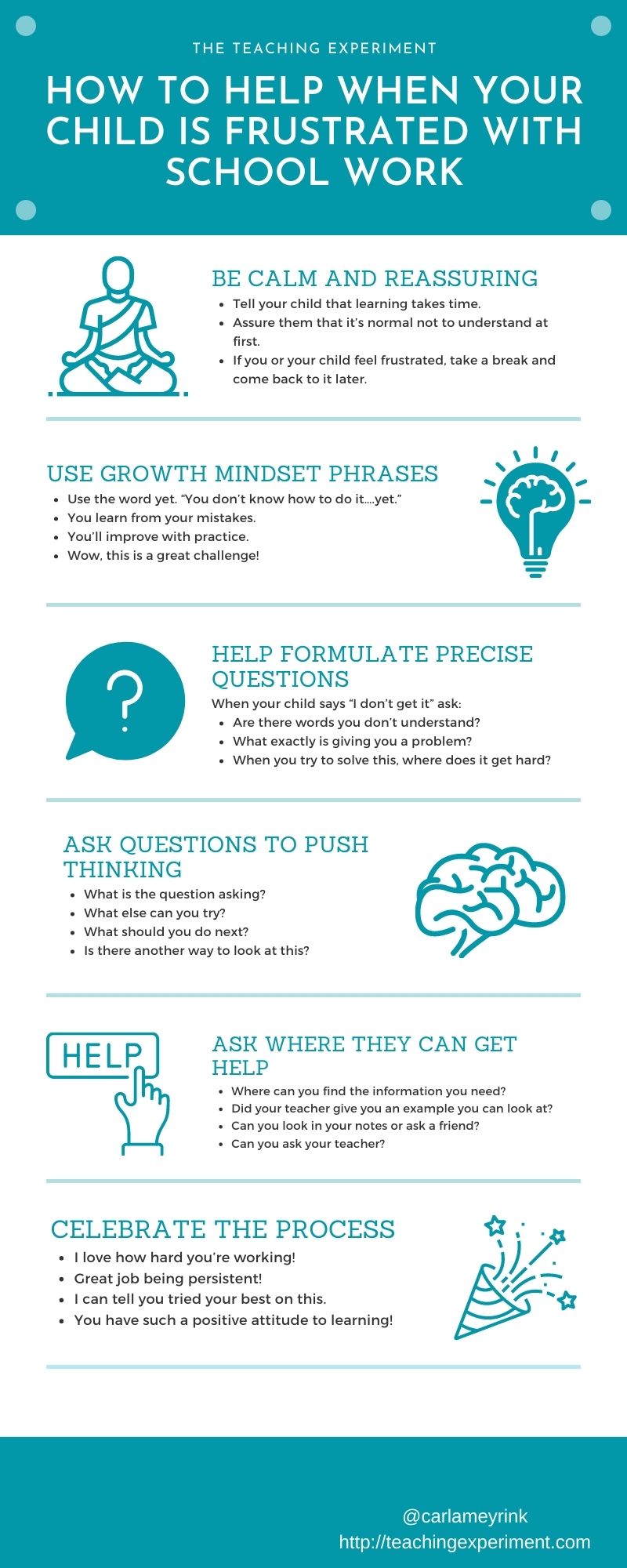6 Ways to Help When Your Child is Frustrated with Their School Work
Last week I gave some ideas for creating a home learning environment for your child. Having a quiet place to work, following a routine, and modeling strong reading habits is a great place to start. But… what happens when your child doesn’t understand the work and feels completely overwhelmed and frustrated? How can you help?
There’s a huge temptation to just get in there and give a quick answer: the frustration ends, and you can relax as a family and enjoy yourselves together. But rushing in to save your child has a number of negative consequences. Children who don’t struggle with problems will become dependent on their parents to solve everything for them. They’ll lose faith in their own ability and won’t develop the self-confidence we all want our children to have. They also lose the opportunity to see how persevering can help them win in the end.
On the other hand, children who struggle with problems and solve them on their own develop:
- Independence
- Self-confidence
- Perseverance
Since we all want these things for our children, here are six ways to help them learn to help themselves:
- Be calm and reassuring. Our children pick up on our emotions. If you feel frustrated by their lack of understanding, they will too. And even worse, they may not realize that you’re upset with the situation, and may believe you’re mad at them. They may infer that they’re too stupid to understand and may label themselves negatively.
- Use growth mindset phrases. Learning is a process that may take time. We don’t learn to speak or walk from one day to the next. The same goes for learning to read, understanding algebra, or writing an essay. Using growth mindset phrases to help your child understand that learning takes time, but they’ll get there:
- Use the word yet. “You don’t know how to do it… yet.”
- “You learn from your mistakes.”
- “You’ll improve with practice.”
- “Wow, this is a great challenge!”
- Help them formulate precise questions. When a problem is difficult, many children tend to say “I don’t get it,” without really looking into what they don’t understand. Help your child look closely at the problem to see if there are words that they don’t understand or if it’s a process that they haven’t mastered yet. By honing in on what exactly is troubling them, students will be able to look for strategies to help themselves, or they’ll be able to formulate a strong question to ask their teacher. Helping your child come up with a good question is far more helpful than giving them an answer.
- Ask questions to push thinking. By asking questions, we help our children learn problem-solving skills. Simple questions like, “What else could you try?” or “Where could you find that information?” teach children the thought processes they need to help themselves.
- Ask where they can get help. In becoming independent learners, students need to have tools for finding information and help. When your child hits a roadblock, don’t tell them to look on the internet or ask their teacher — instead ask them where they can get help. This will help them develop the metacognitive thinking skills they need to gain independence.
- Celebrate the process. Avoid praising your child for their intelligence or abilities. Saying “you’re so smart!” or “that’s beautiful — you’re such a great artist!” sends the message that it’s your children’s inherent abilities that matter rather than their effort. Instead, focus on celebrating the hard work they do, the persistence they show, and the overall effort they put into their work. This will help them understand that with hard work, they can get wherever they want.
By using these strategies, you’ll not only help your child become an independent learner, but you’ll lower their stress levels as well as your own. Changing the habit of jumping in to save your child can be difficult, but it’s well worth it!
For handy reminders (or to share with other parents), feel free to use the infographic below:


Leave a comment